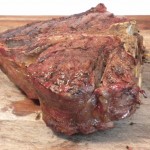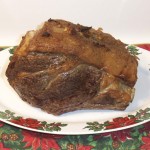Give Me Grassfed Meat, Not Water Pumped Meat!
By Stanley A. Fishman, author of Tender Grassfed Meat

 photo credit: TheGiantVermin
photo credit: TheGiantVermin
Many people have noticed that factory meat is full of water. It is hard to brown except at the highest heat, and water can come gushing out in the middle of cooking. The meat of factory-fed animals is watery and mushy. If that were not enough, much factory meat (though not all) is injected with “solution,” which is usually a mix of tap water and industrial salt. The amount of “solution” injected into meat can be as high as 40% in some chicken breasts, according to an example given by the USDA Food Safety and Inspection Service.
Unbelievably, meat injected with solution is called “enhanced meat.” How can it possibly “enhance” meat to inject it with a large amount of saltwater? Most of that saltwater will cook out, leaving a piece of meat that is much smaller in weight and volume than it was when purchased. The injected water is just as expensive as the meat, so profits are enhanced, at the expense of the consumer. Industrial salt and tap water are literally dirt cheap, so this is serious profit. It might be more accurate to describe it as “enhanced profit meat.”
Sometimes “enhanced meat” is described as having a particular marinade added. Since the marinades are mostly liquid, you are paying the meat price for the liquid in the marinade if you buy such a product.
One of the excuses given for the use of “solution” is the claim that it is needed to make up for the flavor lost by having leaner meat. Well, if the natural flavor of the meat is so bad or so blah that it needs a saltwater solution to be palatable, why buy it in the first place?
Another problem with “solution” is that it contains a large amount of industrial salt, which has been stripped of its minerals. This is not the natural salt that humankind has eaten for most of history. Many people, including myself, want to avoid eating such salt. But if it is not clearly labeled, or served in a restaurant, we could be eating a lot of industrial salt without knowing it.
While meat injected with solution is supposed to be labeled, even the USDA Food Safety and Inspection Service has concluded that the current labeling requirements do not work, finding that some labels do not clearly identify the fact that solution has been added to raw meat. This has led the Food Safety and Inspection Service to propose stricter labeling standards, which are not expected to go into effect until 2014. I commend the government for imposing stricter labeling standards that may actually inform consumers that a significant portion of the “meat” they are purchasing is actually saltwater.
Factory meat is often soaked in a water bath to chill. While sitting in the water bath, the meat can absorb a significant amount of water, which may also have to be disclosed under the new standards.
While stricter labeling is good, I have a better “solution.”
Eat grassfed and grass-finished meat only, which is what I do.
I have never had a piece of grassfed meat that was watery or mushy. I have never had a piece of grassfed meat that gushed water into the pan. I have never had a piece of grassfed meat that was hard to brown. In fact, grassfed meat will brown beautifully at medium heat.
Grassfed meat has a wonderful natural flavor, which varies from breed to breed, and from producer to producer. This flavor does not need to be enhanced with saltwater. In fact, injecting saltwater into grassfed meat would ruin its taste, tenderness, and texture.
Grassfed meat shrinks much less in cooking.
When we buy meat, we should get meat, not a mixture of meat and saltwater.
Grassfed meat can be easily ruined if you try to cook it like you would cook factory meat. But grassfed meat will come out tender and delicious if cooked properly, which is actually very easy to do. Tender Grassfed Meat describes how to do this.
This post is part of Monday Mania, Real Food Wednesday and Fight Back Friday blog carnivals.
RSS feed for comments on this post.
Sorry, the comment form is closed at this time.
Read more
« Diabetes Study Proves Nothing about Grassfed Meat
Grassfed Fat — the Lost Delicacy »


 Photos of recipes from the new book Tender Grassfed Barbecue
Photos of recipes from the new book Tender Grassfed Barbecue
 Photos of recipes from the cookbook Tender Grassfed Meat
Photos of recipes from the cookbook Tender Grassfed Meat
What I’ve Learned Wednesday: Links from Real Food Blogland 8/31/11 | Butter Believer posted on August 31, 2011:
[…] and it’s not so much the bargain choice anymore. Read more about this surprising fact at Tender Grassfed Meat‘s blog, and go out and get yourself some real, 100% […]